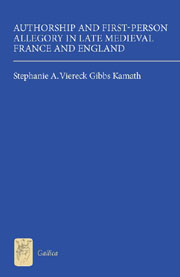Book contents
- Frontmatter
- Contents
- Dedication
- Acknowledgements
- Abbreviations
- A Note on Names, Sources, and Translations
- Introduction
- 1 “Comment ot nom”: Allegory and Authorship in the Roman de la Rose and the Pèlerinage de la Vie Humaine
- 2 “What so myn auctour mente”: Allegory and Authorship in Geoffrey Chaucer's Dreams
- 3 “Thereof was I noon auctour”: Allegory and Thomas Hoccleve's Authority
- 4 Verba Translatoris: Allegory and John Lydgate's Literary Tradition
- Coda
- Bibliography
- Index
- ALREADY PUBLISHED
4 - Verba Translatoris: Allegory and John Lydgate's Literary Tradition
Published online by Cambridge University Press: 05 February 2013
- Frontmatter
- Contents
- Dedication
- Acknowledgements
- Abbreviations
- A Note on Names, Sources, and Translations
- Introduction
- 1 “Comment ot nom”: Allegory and Authorship in the Roman de la Rose and the Pèlerinage de la Vie Humaine
- 2 “What so myn auctour mente”: Allegory and Authorship in Geoffrey Chaucer's Dreams
- 3 “Thereof was I noon auctour”: Allegory and Thomas Hoccleve's Authority
- 4 Verba Translatoris: Allegory and John Lydgate's Literary Tradition
- Coda
- Bibliography
- Index
- ALREADY PUBLISHED
Summary
John Lydgate (c. 1371–1449) is indisputably the most prolific English poet of the fifteenth century and arguably the most prolific poet to write in the English language, as he is credited with some 140,000 lines of verse. Literary scholarship on John Lydgate, while noting the heterogeneous nature of his abundant textual production, has focused on the fifteenth-century Benedictine's evident interest in valorizing the English vernacular and asserting authority for authors composing in English. Mindful of the sixteenth-century Reformation and Renaissance movements, many studies of what has been termed Lydgate's “laureate” poetics look to the auctoritas of Latin texts, to the example of Italian humanists, and to the surrounding English political climate for the English poet's inspiration in this endeavor. The question of what Lydgate's strategies of self-authorization owe to the French allegorical tradition has attracted less attention, yet Lydgate's role as a translator of French allegory is an essential part of his presentation of English poetry and its readers. In passages at times explicitly marked as verba translatoris (words of the translator) by the rubrics of surviving manuscripts, Lydgate crafts English literary history by deploying the allegorical strategies that encode authorship within the late thirteenth-century Roman de la Rose. The Rose devotes the central portion of its allegory to the internal figuration of transactions between author, text, and reader; the revelation and reworking of these transactions in translation stages the development of a newly complex textual hermeneutics in English.
- Type
- Chapter
- Information
- Publisher: Boydell & BrewerPrint publication year: 2012



